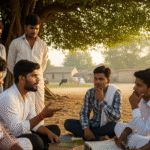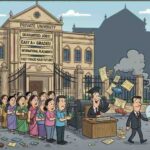Orem, Utah, September 10, 2025 — The auditorium at Utah Valley University was filled with tense silence, then disbelief. As conservative activist Charlie Kirk concluded a sentence during his trademark “Prove Me Wrong” session, a gunshot rang out. Cameras captured the horrific moment: a bullet pierced his neck, sending him reeling backward as panicked screams erupted. Within seconds, blood pooled on the stage. Despite frantic medical efforts, Kirk succumbed to massive blood loss before nightfall.
The 31-year-old founder of Turning Point USA had built a career around polarizing debates, mobilizing young conservatives, and defending former President Donald Trump. His death — violent, public, and televised — has sent shockwaves across the political spectrum.
A Public Assassination
The attack unfolded in front of hundreds of students and was recorded from multiple angles, instantly circulating across social media. Unlike past political shootings that happened in semi-private spaces, this was a front-row assassination in the digital age, captured unfiltered and shared globally in real time.
Police confirmed that a suspect is in custody. While investigations continue, no clear motive has been released. Utah’s governor denounced the killing as “an assault not just on one man, but on free speech itself.”
A Mirror Held Up to Society
Charlie Kirk’s killing is more than the loss of a public figure. It is a grim reflection of a society where political polarization, cultural anger, and easy access to firearms create combustible conditions. America has witnessed assassinations before — from John F. Kennedy to Martin Luther King Jr. — but this tragedy highlights something new: the erosion of boundaries between civic debate and lethal violence, now broadcast in real time to millions.
The fact that the shooting occurred in a university auditorium, a space meant for dialogue and debate, underscores how unsafe even the forums of democracy have become.
Gun Laws Under Fire Again
The Utah shooting is already intensifying America’s most intractable policy debate: gun control. Advocates argue that Kirk’s death shows once again how dangerously accessible firearms remain in the United States. Despite years of mass shootings, legislative reforms have been piecemeal, blocked by partisan gridlock and lobbying pressure.
Supporters of stricter laws point to countries like Australia and the United Kingdom, where firearm restrictions dramatically reduced gun deaths. In the U.S., however, nearly 400 million civilian-owned guns exist — more than the population itself. Critics warn that until universal background checks, restrictions on high-capacity weapons, and stronger red flag laws are implemented, tragedies like Utah will recur.
Gun-rights defenders counter that no law could have prevented a determined attacker. Yet for many, the sheer visibility of this assassination — a nationally known figure cut down mid-sentence — could tilt the political calculus.
A Turning Point in More Ways Than One
Charlie Kirk built his career on sharp words and unyielding conservatism. Ironically, his final moments may leave a legacy far beyond ideology: a national reckoning about where American society is headed.
Is the U.S. drifting into an era where every public forum risks turning into a crime scene? Or will Kirk’s death galvanize leaders across divides to finally address the crisis of gun violence that has plagued the nation for decades?
For now, America mourns a man who thrived on confrontation but did not deserve to meet his end through it. The cameras that once amplified his message have now immortalized his death — a searing reminder of the violence gnawing at the fabric of American democracy.



























